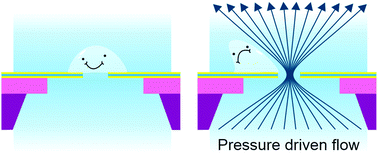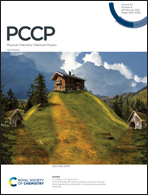Wetting of nanopores probed with pressure†
Abstract
Nanopores are both a tool to study single-molecule biophysics and nanoscale ion transport, but also a promising material for desalination or osmotic power generation. Understanding the physics underlying ion transport through nano-sized pores allows better design of porous membrane materials. Material surfaces can present hydrophobicity, a property which can make them prone to formation of surface nanobubbles. Nanobubbles can influence the electrical transport properties of such devices. We demonstrate an approach which uses hydraulic pressure to probe the electrical transport properties of solid state nanopores. We show how pressure can be used to wet pores, and how it allows control over bubbles or other contaminants in the nanometer scale range normally unachievable using only an electrical driving force. Molybdenum disulfide is then used as a typical example of a 2D material on which we demonstrate wetting and bubble induced nonlinear and linear conductance in the regimes typically used with these experiments. We show that by using pressure one can identify and evade wetting artifacts.



 Please wait while we load your content...
Please wait while we load your content...